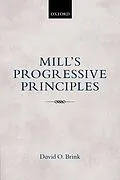In Mill's Progressive Principles David Brink provides a systematic reconstruction and assessment of John Stuart Mill's contributions to the utilitarian and liberal traditions, examining his first principles and their application to issues of representative democracy and sexual equality. Brink defends novel interpretations of key elements in Mill's moral and political philosophy, including his concepts of motivation, happiness, duty, proof, harm and the harm principle, freedom of expression, anti-paternalism, representative democracy and weighted voting, and sexual equality. However, the most distinctive aspect of this account of Mill's commitments is the case it makes for a perfectionist reading of his conception of happiness and the significance this has for other aspects of his moral and political philosophy. On this perfectionist conception, the chief ingredients of happiness involve the exercise of a person's capacities for practical deliberation and decision that mark us as progressive beings. Once this perfectionist theme is made explicit, it can be shown to be central to Mill's views about utilitarianism, liberalism, rights, democratic government, and sexual equality.
Autorentext
David O. Brink is Professor of Philosophy at the University of California, San Diego and a Director of the Institute for Law and Philosophy at the University of San Diego School of Law. His research interests are in ethical theory, history of ethics, and jurisprudence. He is the author of Moral Realism and the Foundations of Ethics (CUP, 1989) and Perfectionism and the Common Good: Themes in the Philosophy of T.H. Green (OUP, 2003).
Zusammenfassung
In Mill's Progressive Principles David Brink provides a systematic reconstruction and assessment of John Stuart Mill's contributions to the utilitarian and liberal traditions, examining his first principles and their application to issues of representative democracy and sexual equality. Brink defends novel interpretations of key elements in Mill's moral and political philosophy, including his concepts of motivation, happiness, duty, proof, harm and the harmprinciple, freedom of expression, anti-paternalism, representative democracy and weighted voting, and sexual equality. However, the most distinctive aspect of this account of Mill's commitments is the case it makes for a perfectionist reading of his conception of happiness and the significance this has forother aspects of his moral and political philosophy. On this perfectionist conception, the chief ingredients of happiness involve the exercise of a person's capacities for practical deliberation and decision that mark us as progressive beings. Once this perfectionist theme is made explicit, it can be shown to be central to Mill's views about utilitarianism, liberalism, rights, democratic government, and sexual equality.
Inhalt
- TABLE OF CONTENTS
- Preface
- A Note on Mill's Texts
- 1: Mill's Radical Background
- 2: Varieties of Motivation
- 3: Perfectionism about Happiness and Higher Pleasures
- 4: Ambivalence about Duty
- 5: The Justification of Utilitarianism
- 6: Liberal Preliminaries
- 7: Freedom of Expression in a Liberal Context
- 8: Liberal Principles Refined
- 9: Liberalism, Utilitarianism, and Rights
- 10: Liberal Democracy
- 11: Sexual Equality
- Epilogue
- Bibliography
- Index
